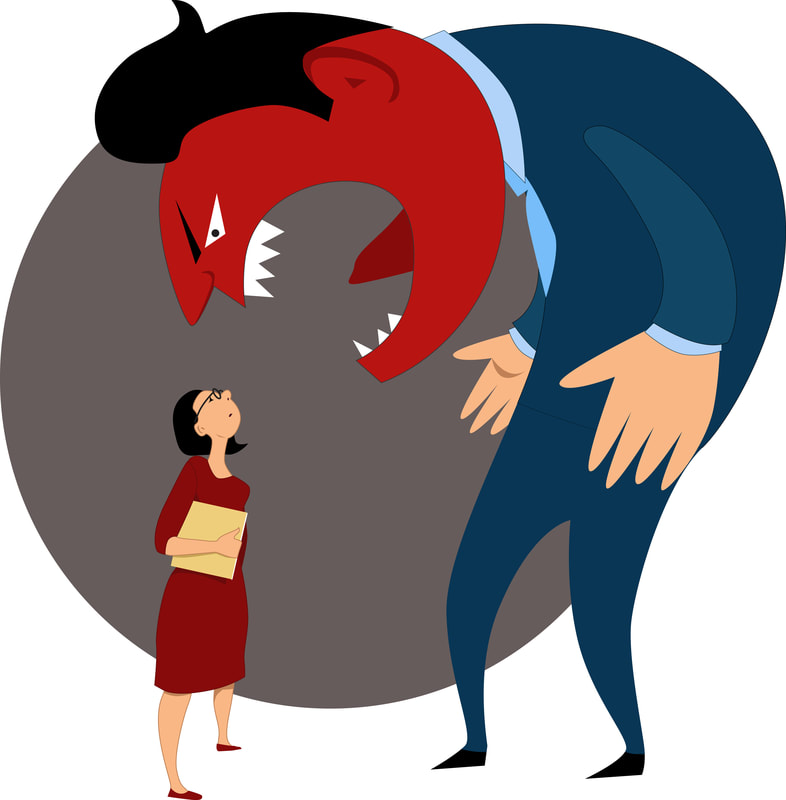"The 'Way' is the strong bond your people have with you. Whether they face certain death or hope to come out alive, they never worry about danger or betrayal." Sun Tzu
Sun Tzu gave five factors that determine success in war, and the very first factor listed is called the "Way," the unspoken bond the leader has with his or her people. Thus, the leader breaking the people's trust in him or her would prove fatal, and few matters break people's trust more than harassment.
Simply put, harassment is the abusing of someone. This is the opposite of strategy, because it is a cruel, selfish, and thoughtless method. Harassment is rash and takes no planning whatsoever. The result would inevitably be devastating, especially for the abused. As Sun Tzu said, "Those angry will be happy again, and those wrathful will be cheerful again, but a destroyed nation cannot exist again, the dead cannot be brought back to life."
Sun Tzu further connects anger with calamity here: "If the general cannot control his temper and sends troops to swarm the walls, one third of them will be killed, and the city will still not be taken. This is the kind of calamity when laying siege to a walled city."
As if that wasn't enough, Sun Tzu clearly sums it up by including anger as one of the five dangerous traits of a general: "He who is quick tempered can be insulted ... [and would be] disastrous in warfare."
Instead, the leader must be "wise, trustworthy, benevolent, brave, and disciplined."
Recently in the news, Harvey Weinstein has served as an example of harassment in the workplace. The consequences for his actions have been his dismissal out of the company he co-founded and expulsion from the Motion Picture Academy, which gives out the Oscars.
Although that all seemed like justice, the fact remains that Weinstein admitted to having sexually abused women for decades, and the consequences didn't transpire until his wrongdoings were exposed in The New York Times.
Anyone who has ever worked for a company in his or her lifetime would likely know firsthand harassment in the workplace, whether it be verbal, racial, sexual, etc.
Most perpetrators are not as famous as Harvey Weinstein, and thus their abuses would never be in the news. What often happens is the incident is reported to the company's Human Resources department (HR) or Legal department where in too many cases it functions as a protector of the company than of the victim reporting the abuse.
Harassment in the workplace is further clouded by otherwise good people who look the other way when harassment happens before their eyes. Perhaps people don't want to jeopardize their own jobs. Maybe they don't feel it's their place to get involved in a conflict between two individuals. Or they think to themselves, "Why bother because things wouldn't change for the better anyway."
After the Weinstein story broke, more people came out to expose individuals who abused their positions or who condoned their behaviors. So it would seem the problem exists, only the timing of us knowing about it is delayed.
Since individual behaviors are difficult to predict and prevent, harassment in the workplace will probably continue in the foreseeable future. However, society's acceptance of such behaviors is something that must stop.
Just because something is common doesn't mean it's right. Just because something has been done in the past doesn't mean it's right. Just because a person is more powerful doesn't mean he or she is right. We must think critically. We must think for ourselves and not depend on others to think for us.
Words of support are beneficial but insufficient. Only actions taken to hold those abusers accountable would make a difference. The difference would be in the number of occurrences and the longevity of those occurrences.
Simply put, harassment is the abusing of someone. This is the opposite of strategy, because it is a cruel, selfish, and thoughtless method. Harassment is rash and takes no planning whatsoever. The result would inevitably be devastating, especially for the abused. As Sun Tzu said, "Those angry will be happy again, and those wrathful will be cheerful again, but a destroyed nation cannot exist again, the dead cannot be brought back to life."
Sun Tzu further connects anger with calamity here: "If the general cannot control his temper and sends troops to swarm the walls, one third of them will be killed, and the city will still not be taken. This is the kind of calamity when laying siege to a walled city."
As if that wasn't enough, Sun Tzu clearly sums it up by including anger as one of the five dangerous traits of a general: "He who is quick tempered can be insulted ... [and would be] disastrous in warfare."
Instead, the leader must be "wise, trustworthy, benevolent, brave, and disciplined."
Recently in the news, Harvey Weinstein has served as an example of harassment in the workplace. The consequences for his actions have been his dismissal out of the company he co-founded and expulsion from the Motion Picture Academy, which gives out the Oscars.
Although that all seemed like justice, the fact remains that Weinstein admitted to having sexually abused women for decades, and the consequences didn't transpire until his wrongdoings were exposed in The New York Times.
Anyone who has ever worked for a company in his or her lifetime would likely know firsthand harassment in the workplace, whether it be verbal, racial, sexual, etc.
Most perpetrators are not as famous as Harvey Weinstein, and thus their abuses would never be in the news. What often happens is the incident is reported to the company's Human Resources department (HR) or Legal department where in too many cases it functions as a protector of the company than of the victim reporting the abuse.
Harassment in the workplace is further clouded by otherwise good people who look the other way when harassment happens before their eyes. Perhaps people don't want to jeopardize their own jobs. Maybe they don't feel it's their place to get involved in a conflict between two individuals. Or they think to themselves, "Why bother because things wouldn't change for the better anyway."
After the Weinstein story broke, more people came out to expose individuals who abused their positions or who condoned their behaviors. So it would seem the problem exists, only the timing of us knowing about it is delayed.
Since individual behaviors are difficult to predict and prevent, harassment in the workplace will probably continue in the foreseeable future. However, society's acceptance of such behaviors is something that must stop.
Just because something is common doesn't mean it's right. Just because something has been done in the past doesn't mean it's right. Just because a person is more powerful doesn't mean he or she is right. We must think critically. We must think for ourselves and not depend on others to think for us.
Words of support are beneficial but insufficient. Only actions taken to hold those abusers accountable would make a difference. The difference would be in the number of occurrences and the longevity of those occurrences.
For employees:
If you see wrongdoing in the workplace, speak up. It is not only moral to do so, but also practical. If the abuser can do it to someone else, he or she can do it to you! Stick together and stick up for each other. Ultimately, even if you were fired due to your speaking up, do you really want to stay and help an immoral company succeed?
For top management:
What kind of company do you want to lead? Even if you succeed financially, would you be proud of what you built, achieved, and later leave behind as your legacy? Sun Tzu advised that a general must treat his soldiers as if they are his beloved children, and they will follow him to the deepest valleys, even to the valley of death. Are you truly doing so in your company? It is the job of leaders to unlock people's potential, because with good leadership, anybody can bring value to any company. But not anybody would bring value to a company that abuses people.
People want to do a good job. Make "Way" for people's success by not being in their way. Only then can we achieve success that lasts.
If you see wrongdoing in the workplace, speak up. It is not only moral to do so, but also practical. If the abuser can do it to someone else, he or she can do it to you! Stick together and stick up for each other. Ultimately, even if you were fired due to your speaking up, do you really want to stay and help an immoral company succeed?
For top management:
What kind of company do you want to lead? Even if you succeed financially, would you be proud of what you built, achieved, and later leave behind as your legacy? Sun Tzu advised that a general must treat his soldiers as if they are his beloved children, and they will follow him to the deepest valleys, even to the valley of death. Are you truly doing so in your company? It is the job of leaders to unlock people's potential, because with good leadership, anybody can bring value to any company. But not anybody would bring value to a company that abuses people.
People want to do a good job. Make "Way" for people's success by not being in their way. Only then can we achieve success that lasts.


 RSS Feed
RSS Feed